#labour unions
Explore tagged Tumblr posts
Text
114th anniversary
youtube
I don't see people talking about this so today is the 110th anniversary of the Triangle Shirtwaist Factory fire, in where the factory owners locked working women and girls inside to "eliminate the risk of theft" (in reality it was too keep them from taking breaks), which resulted in the gruesome deaths of 123 mostly immigrant women and girls and 23 men, many of whom jumped to their deaths from the ninth floor either in a panicked attempt to escape or in order to die quickly. There were reports that some of the workers were on fire already as they jumped.
The eighth floor of the building was able to telephone the tenth floor to warn them about the fire, but the factory on the ninth floor where these women and girls labored had no such communication and such warning.
The factory owners were criminally charged with manslaughter for actions that contributed to the mass deaths but acquitted. However, this tragedy led to mass sympathy to the labor movement, and unions spurred on safety regulations that passed in New York state and eventually the entire country, and activists were able to reduce child labor in the process.
This tragedy is a reminder that has been forgotten in the 110 years since: every safety regulation-- every scrap of paperwork contributing to the hundreds of pages of red tape people like to complain about--every word of it was written in the blood of a laborer.
#Triangle Shirtwaist Factory fire#labour history#labour unions#women in history#bread and roses#pride#solidarity#Youtube
75K notes
·
View notes
Text
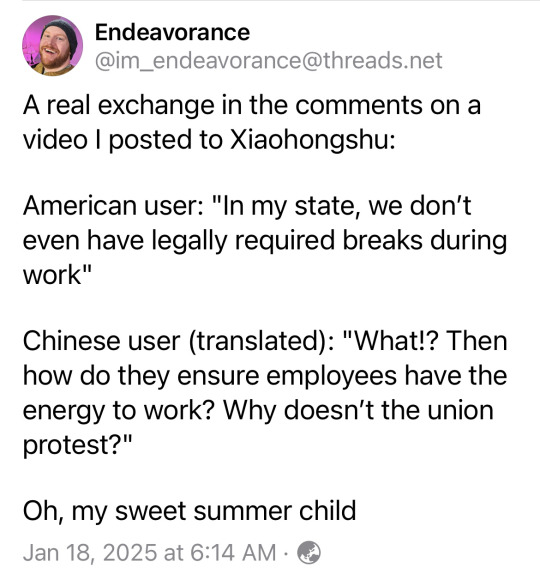
Xiaohongshu = RedNote app
#xiaohongshu#rednote#labor laws#labour law#labor law#labour laws#unions#union strong#labor unions#labour unions#work#work break#effectiveness#protest#protests#cultural exchange#china#united states#us politics#american politics#political#politics#labor policy#labour policy#work life#chinese#american
258 notes
·
View notes
Text
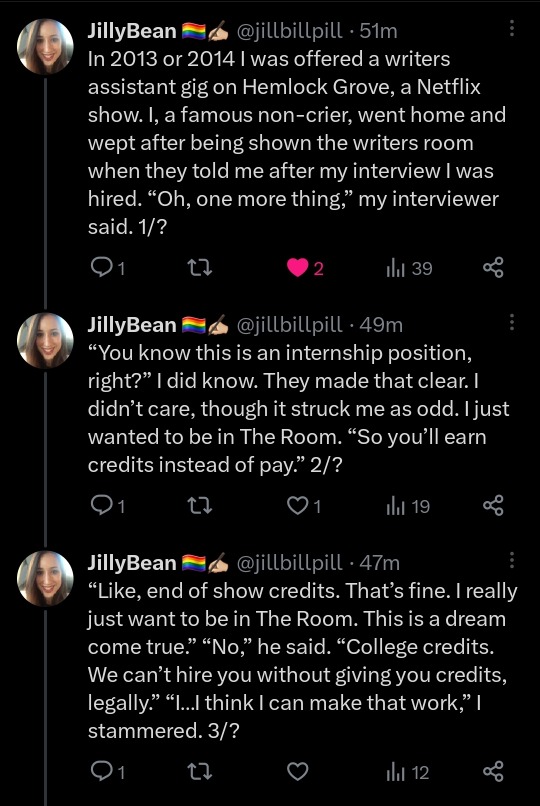
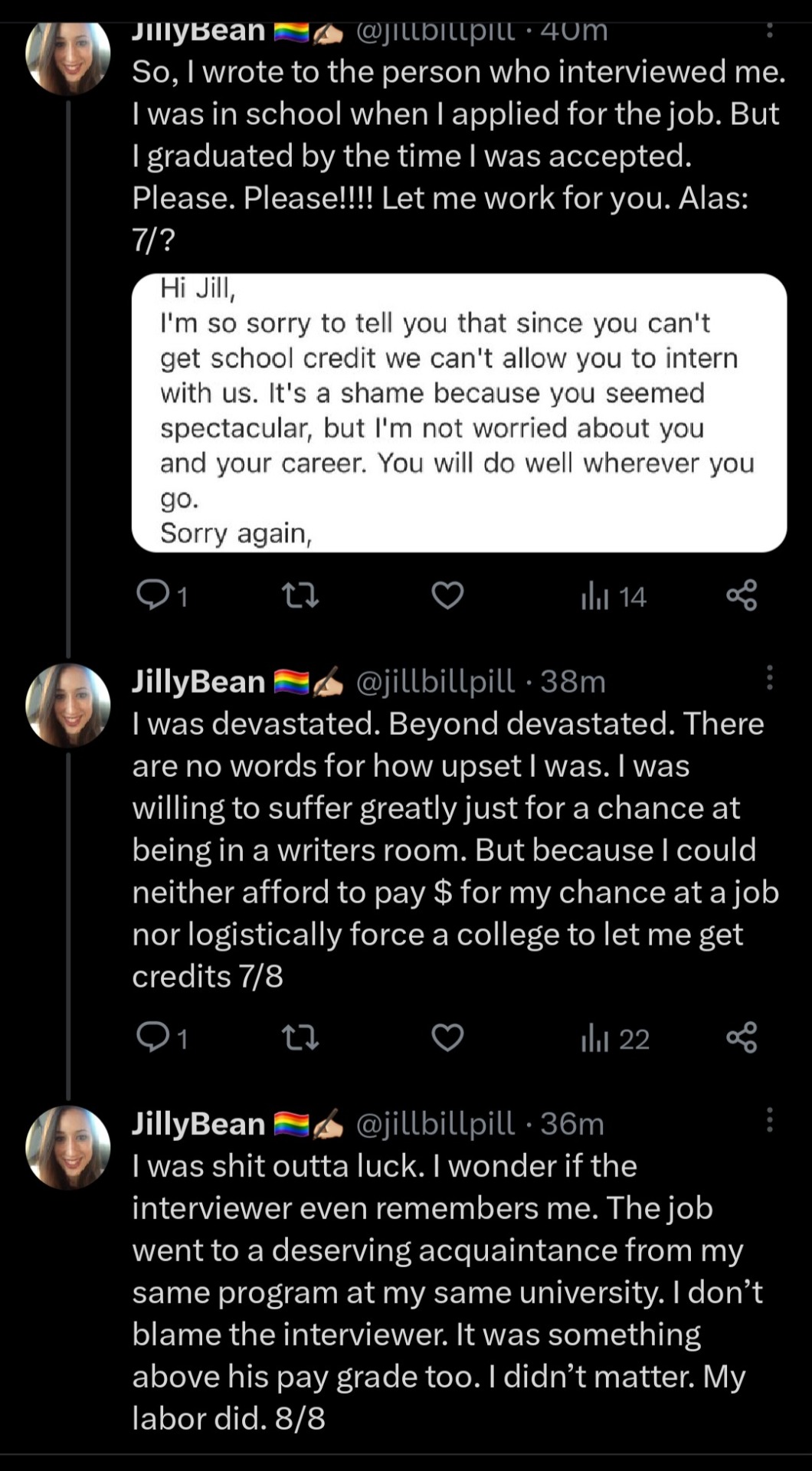
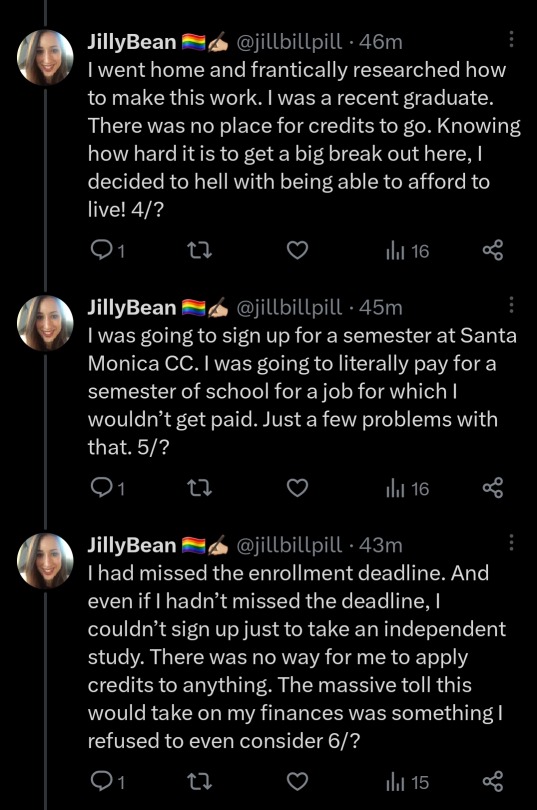
Here's how to help support those making your shows!
2K notes
·
View notes
Text
Made in the USA: Wage Theft, Fraud and Hidden Sweatshops
Unrolled twitter thread by derek guy (@dieworkwear)
4 Oct 24 • Read on X
ALT enabled on all images. Video has closed captions but is not transcribed.
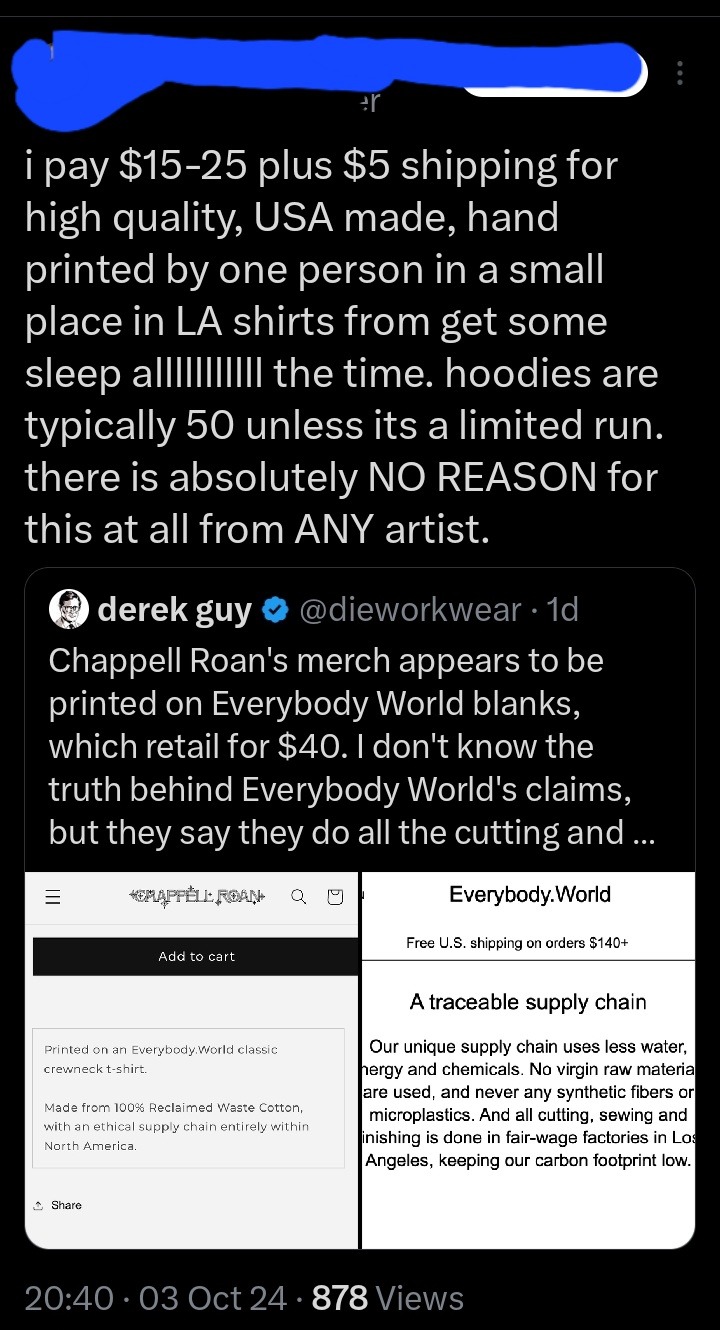
Not trying to create a pile-on here. But let's talk about why something might still be made in unethical conditions even though it bears a "made in USA" tag. 🧵
The first thing to understand is that not all workers are covered by US labor laws. You might assume that workers get paid a minimum wage (after all, it says "minimum"). In fact, many garment workers in the US toil under what's known as the piecework system.
Piecework means you get paid not by the amount of time you work but the number of operations you complete. This system should be familiar to many of you. As a writer, I get paid per word. The pay is the same whether it takes me 100 or 10 hours to write a 1,000 word article.
My situation is fine bc I get paid enough to eat. But for a garment worker, the pay structure can be peanuts: three cents to sew a zipper or sleeve, five cents for a collar, and seven cents to prepare the top part of a skirt. These are real numbers for LA-based garment workers.
Piecework is how companies skirt minimum wage laws. Among labor organizers, the term "wage theft" refers to the difference between what a worker should have earned under min wage laws and what they actually earned through the piece rate system.
This system is incredibly common. A 2016 UCLA Labor Center study showed the median piece-rate worker in Los Angeles scrapes together $5.15 per hour—less than half the state’s mandated minimum wage. Labor conditions are also very bad: poor ventilation, dusty air, rats and mice.
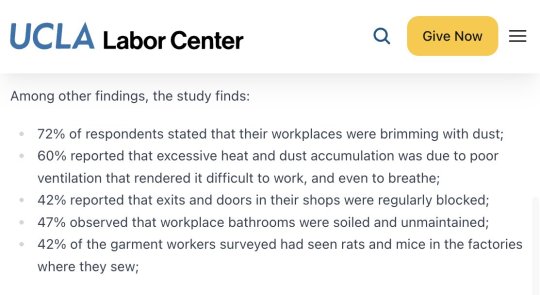
A Federal Department of Labor investigation the same year found that 85 percent of Los Angeles garment factories were breaking labor laws. In 2016, these violations amounted to $1.3 million in back wages owed to 865 workers in a sample of 77 factories. This is wage theft.
In 2021, labor organizers won a fight to get piecework banned in California. But two years later, it's still incredibly common. I interviewed an LA-based garment worker who toils 12 hrs a day for $50. She sleeps in the corner of a kitchen. From my article in The Nation:
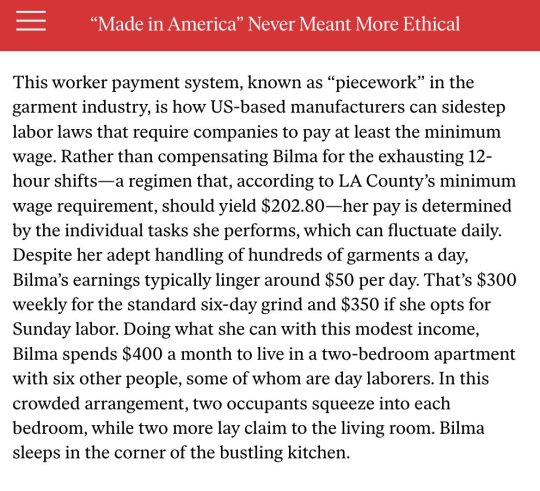
Currently, there's a new fight get piecework banned nationwide through the FABRC Act. I would link, but Twitter throttles threads that have outbound links, so I would prefer if you Google how you can support this legislation. Or follow @GarmentWorkerLA for more info.
The other reason why a "made in USA" tag may not mean much has to do with how the label is applied.
When you see this label inside your garment, what do you assume? Think about this before moving on to the next tweet.
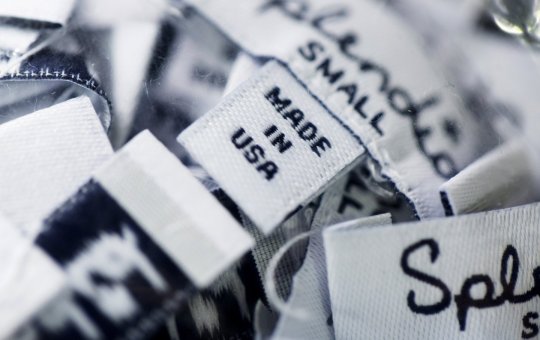
The Federal Trade Commission has pretty strict rules on who gets to apply that label. For clothes, the item has to be cut and sewn in the US using materials that were made in the US. The FTC tries to match its rules with the common understanding of what "made in US" means.
If you're a giant company like Levi's or LL Bean, you may have lawyers who are advising you on these rules. This is why you see labels like "imported," which means the item was made abroad. Or "made in the US from imported materials" when they can't meet the MiUSA standard.
But it's incredibly common for companies to violate FTC rules. In 2022, the FTC fined the pro-Trump brand Lions Not Sheep $211k for labeling their t-shirts "made in USA" when the shirts were actually imported from China and other countries.
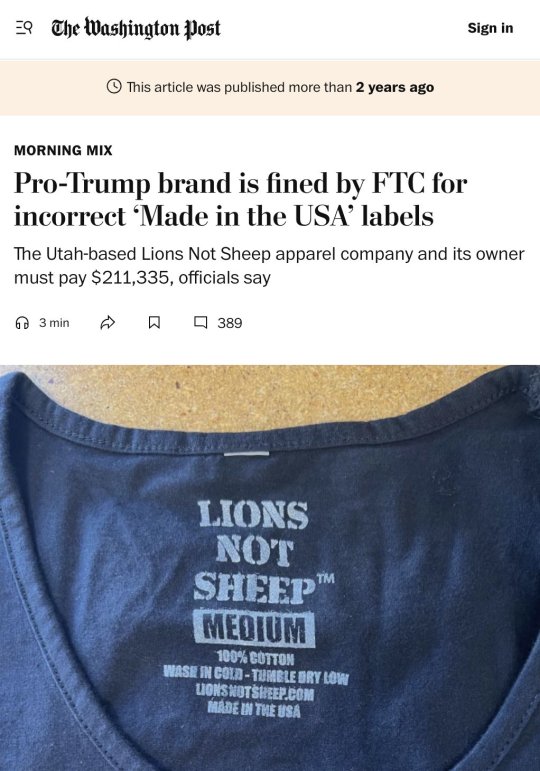
The company was basically importing blanks from China, ripping out the "made in China" label, screen printing the shirt in the US, and then applying a new screen-printed "made in US" label. CEO Sean Whalen claimed he was being persecuted for his pro-Trump views.
But the whole thing started bc Whalen made a video about how his customers are price sensitive, so he imports blanks from China. That's what kicked off the FTC investigation. So while this mislabeling is common, it's hard to get caught unless you make a video about your crimes.
The truth is that making a t-shirt in the USA according to FTC standards will result in a relatively expensive garment. Heddels and Velva Sheen both produce shirts in the US from US grown cotton. The first is $26; second is $90 for a two-pack.
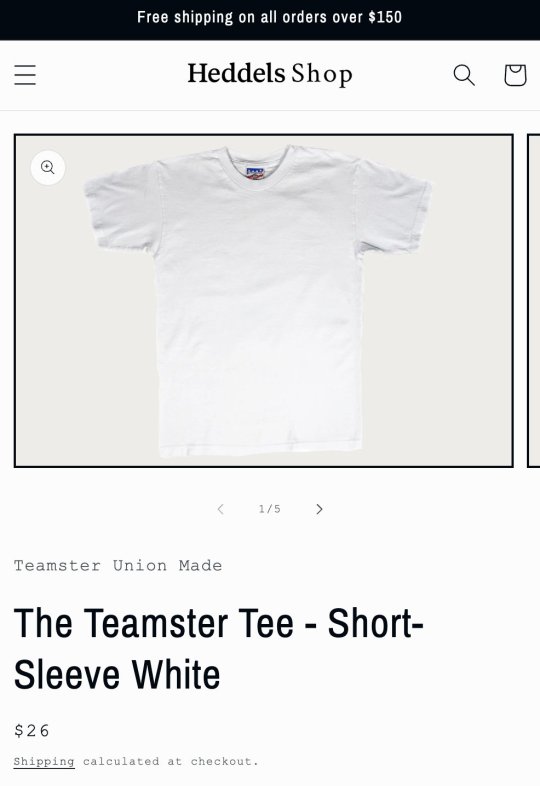
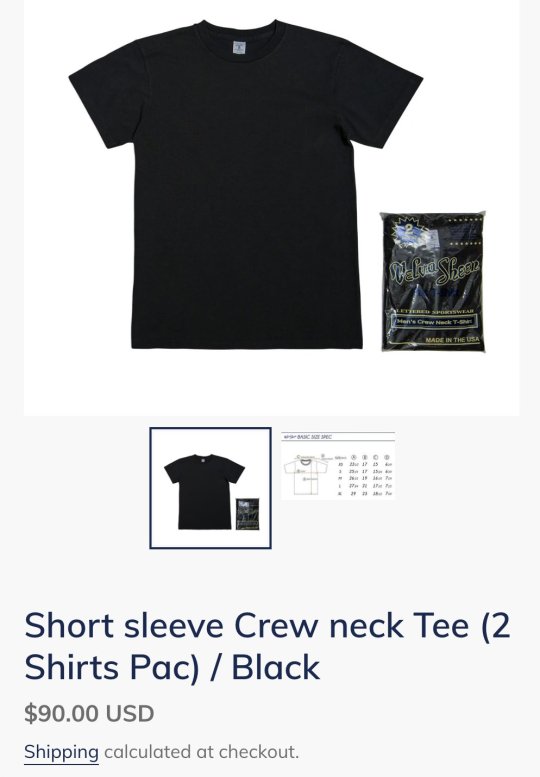
Once you add things such as screenprinting—or if you want a more unique cut and not just basic blanks—the costs go up. This is why Bikers for Trump sourced their merch from Haiti. They knew their customers would not pay an extra $8 for true made-in-USA production.
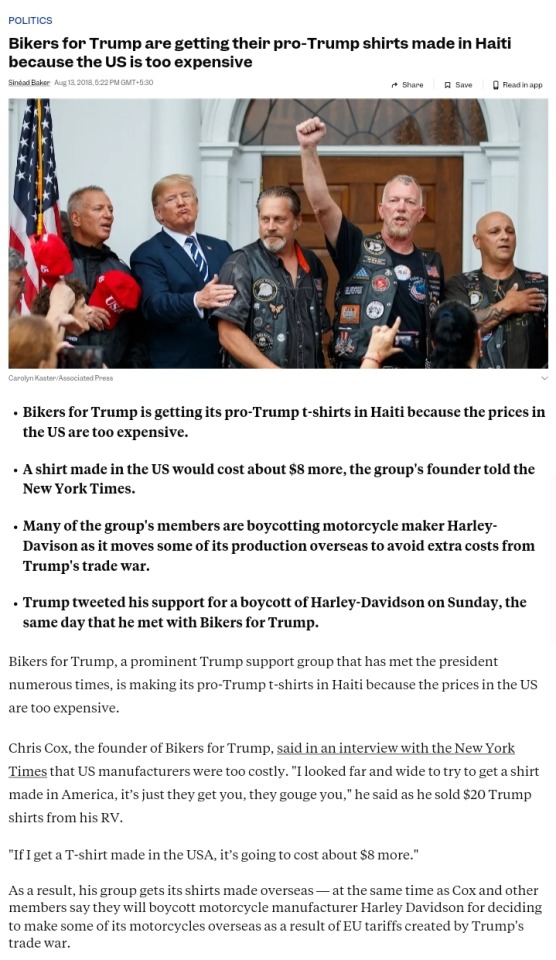
Today, there are countless companies that make merch for other organizations. They source their t-shirts from a variety of places—some made in the US, most not—and then screenprint a design and fulfill orders. This way, the other org doesn't have to do any work but marketing.
When you see a screenprinted t-shirt for $20, ask yourself: Where was the material grown? Where were the yarns spun? Where was the cutting, sewing, and finishing performed? Where was the screenprinted done? What were the wages and labor conditions along these steps?
I'm not a nationalist, so I don't prioritize American jobs over foreign ones. But I do care about fair wages and labor protections. Just because something was made abroad doesn't mean it was made in a sweatshop. Just because it was made in the US doesn't mean fair wages.

Paying more for a garment is also no guarantee of ethical manufacturing. But when the price of a garment is so low, you leave little on the table for workers. Just because you see a $20 t-shirt that says "made in USA" doesn't mean it was made fairly.
Please don't harass the person who posted that original tweet. My intention is not to cause harm or stress for anyone. Only to help shed light on what goes into garment manufacturing, fair labor, and labeling. Hopefully, you will consider these issues when shopping.
For the inevitable question: "How do I make sure my clothes were made ethically?" This is very difficult to answer in a thread. My simplest answer is that we should elect pro-worker politicians, fight for pro-labor laws, and empower unions so workers can advocate for themselves.
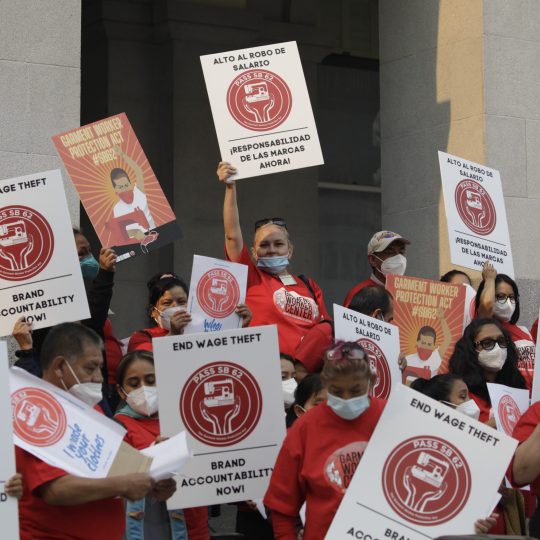
--------------------End----------------------
TL; DR: Doesn't matter if it's the US, if it's not union it's probably a sweatshop. And not all merch is priced high because of fair labour conditions (looking at Taylor Swift and Beyoncé). Look for supply chain transparency.
#sweatshops#fashion#american sweatshop#chappell roan merch#sweatshirt#chappell roan#merchandise#made in usa#garment industry#fast fashion#worker rights#labour rights#labour unions#capitalism#worker exploitation#us politics#us law#knee of huss
133 notes
·
View notes
Text

Unions Have Always Done The Impossible!
A new cartoon for May Day! This has been an incredible year for unions in the USA - may next year be even better.
Transcript, comments, and supporting blah blah about this cartoon are at https://www.patreon.com/posts/103291731 .
My labor is paid for by hundreds of supporters pledging low amounts - $1-$3 - and that's just how I like it! patreon.com/barry
#policartoon#political cartoon#political cartoons#political comics#MayDay#union strong#labour unions#unions#living wage#ubi
182 notes
·
View notes
Text
Ontario government engineers participating in rotating strikes that involve stopping work on Highway 413 and the Bradford Bypass amid contract negotiations are alleging the province is now unlawfully locking them out and interfering with their right to strike. Members of the Professional Engineers Government of Ontario, which represents more than 600 professional engineers and land surveyors who work for the province, have filed a complaint with the Ontario Labour Relations Board. They have been in a legal strike position since Oct. 8 and late last month started rotating strikes, withdrawing services from the key Ontario infrastructure projects. They now say the government is effectively suspending those workers by telling them they cannot return to work "until further notice by the employer." "The (government's) intent is clear: by indefinitely banning from the workplace those who withdraw their services, the (government) sends a message to any possible second rotation of strikers that they too will be indefinitely banned from the workplace," PEGO wrote in its submission to the labour board.
Continue Reading
Tagging: @newsfromstolenland
#unions#strike#labour rights#labour unions#infrastructure#ontario#cdnpoli#canada#canadian politics#canadian news
41 notes
·
View notes
Text
Downton Abbey's top tips for social advancement:
Get an unexpected inheritance.
Marry rich.
Study in secret and hope one of your betters will be impressed by your pluck.
Heroic sacrifice including disfigurement to save your betters.
Seduce a duke.
Blackmail.
Go work in a factory instead.
Organise with your peers for collective barganing.
Vote for redistribution of wealth.
29 notes
·
View notes
Text
just learned that my dad is a union member??? that's why he was borrowing my laptop all the time lately. he was voting in the union's elections in online meetings.
#proud of him for that ngl#its a small union tho. only like 600 people#labour unions#unions#unionize#rambles#wills mumbles
12 notes
·
View notes
Text
youtube
Happy #LabourDay! We’re marking the occasion with some union-related etymologies!
#labour day#labor day#union#unions#labour unions#labor unions#etymology#words#language#linguistics#connectedatbirth#word nerd#wordnerd#history of english#history of the english language#historical linguistics#lingcomm#lingblr#video#youtube
5 notes
·
View notes
Text

NO STRIKE BABY!!!
Teamsters and basic crafts are still at the negotiating table though...
4 notes
·
View notes
Text
Today is the best day to unionize your workplace!
3 notes
·
View notes
Text

The Union's Demands Are Impossible!
"A year from now, all auto companies will be out of business!"
We can keep making these cartoons because of lots of people supporting us - most only at the $2 or $1 levels - which is something I find really cool. Join us! patreon.com/barry
69 notes
·
View notes
Text
No Frills workers at 17 stores in Ontario have ratified a new collective agreement that raises wages and expands the number of full-time jobs, the union representing them has confirmed. A press release from Unifor said the deal, which covers almost 1,300 workers, will see wages rise between $3.20 and $4.50 an hour over the duration of the agreement. The five-year contract also includes a new benefits program for part-time workers and creates 30 new full-time positions to be filled within a year.
Continue Reading
Tagging @politicsofcanada
#cdnpoli#canada#canadian politics#canadian news#ontario#unions#labour unions#workers rights#union victories
114 notes
·
View notes
Text
Am on Schroedinger's Picket Line at the moment...
If my work building is behind a picket line tomorrow, as a member of a sister union, I won't be crossing. If my work building isn't being picketed, the day goes on as normal. We're supposed to be informed of picket locations by tonight sometime. Which I don't mind a bit, but it would be nice to know, as it may mean a one-hour commute just to have to leave!
I think pickets are being strategically planned for a few hours per location, though, to maximize impact and so people don't just stay home and shut down offices. Not having to leave your desk until 10 or 11 am means staff will still come to work, which means more people on campus to walk the lines. Works for the pickets, but it also means that staff in my own union don't lose a whole day's pay by striking in solidarity - they can still make it up in picket line pay.
Solidarity forever, and information please!
2 notes
·
View notes
Text
Visiting the Monterey Bay aquarium was the highlight of my vacation to California several years ago. I support these unionization efforts to ensure that many more visitors have the chance to say the same.
pssst the Monterey Bay Aquarium workers are unionizing and you can show your support 👇
#politics#unions#union#unionization#trade union#trade unions#trade unionism#labor#labour#labor union#labor unions#labour union#labour unions#monterey bay aquarium#labor rights#union strong#unionize
18K notes
·
View notes
Text
my grandmum freaking out and telling me to never tell ANYONE when i told her my dad's in a labour syndicate (she thought it meant like a fucking mafia type organization)
2 notes
·
View notes